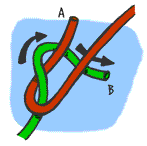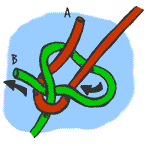The Sheet Bend
![]()
![]()
A knot for 2 different sized ropes
A sheet bend is more secure than a square knot, but a little more difficult to untie. It's useful for joining two lines together of different sizes or quality. Use a sheet bend if you're going to put heavy stress on the knot, if one end is hard to bend or tie, or if you don't want the knot to come undone any time soon.
Step 1: Loop
it
Bend one end (call it end A) into a J shape, where the working end is
the long part of the J. Hold it in your nondominant hand.

Step 2: Thread
it
Take the other end (end B) in your
dominant hand and move it under the loop of the J. Then thread end B
up through the loop of the J.
Step 3: Wrap
it
Wrap end B around the short side of
the J shape. Pass end B all the way under the loop and up the long
side of the J shape.
Step 4: Thread
it
Now, you want to pass end B across
the loop. Push end B through the section of end B where it first
snakes up through the J shape. Then pull end B out--it should pass
over the short side of the J shape.

If you were to walk end B across the J shape, the pattern would be Over, Under, and Over again.
Pull tight on end B first. Then pull the two working ends to secure the knot.
If you are joining two ropes of different qualities, notice which end is harder to tie. Is one end thicker, stiffer or rougher? This one should be end A. The thinner, more flexible, or more slippery of the two ends should be end B. Then tie the sheet .